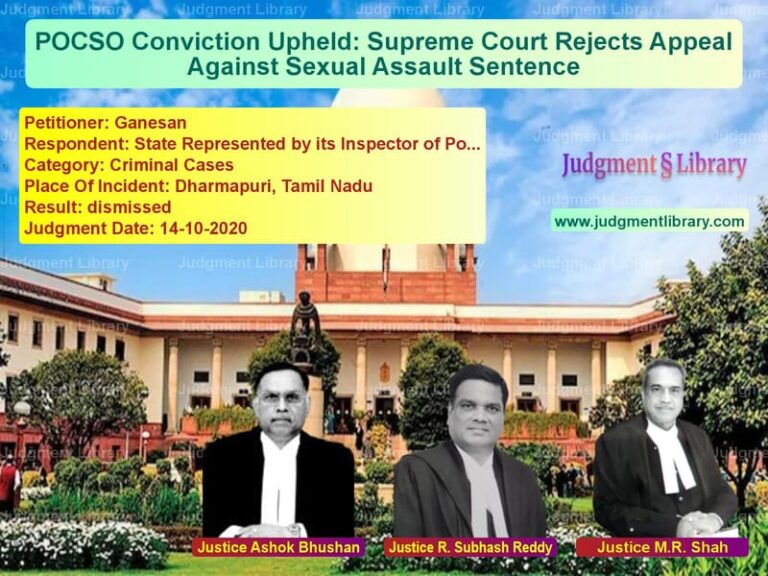Supreme Court Reduces Sentence in 30-Year-Old Case Involving Public Servant Assault
The Supreme Court of India recently delivered a judgment in the case of Razia Khan v. The State of Madhya Pradesh, concerning an incident that took place in 1992. The appellant, Razia Khan, was convicted under Sections 333, 353, and 451 of the Indian Penal Code (IPC) for assaulting a public servant and causing grievous hurt. The case raises significant legal questions about sentencing and leniency in prolonged legal proceedings.
Background of the Case
According to the prosecution, the incident occurred on December 1, 1992, when the appellant, a social worker and political activist, barged into an official meeting of the Directorate of Women and Child Development in Bhopal. The meeting was attended by Ms. Sajni Batra (PW-1), a Deputy Director, and Shri P. Raghvan (PW-6), the Commissioner.
The prosecution alleged that the appellant threw a file at PW-6 and used abusive language. When PW-1 attempted to intervene, the appellant pushed her, causing PW-1 to suffer a fracture in her little right finger. The appellant allegedly claimed to be the sister of a Member of Parliament and threatened to remove PW-6 from his post.
Legal Proceedings
The Sessions Court convicted the appellant and sentenced her to:
- Two years rigorous imprisonment and a fine of ₹2,000 for the offence under Section 333 IPC (Voluntarily causing grievous hurt to deter a public servant).
- One year rigorous imprisonment each for the offences under Sections 451 IPC (House trespass) and 353 IPC (Assault or criminal force to deter a public servant).
The appellant challenged the conviction before the High Court, which upheld the conviction but reduced the substantive sentence to six months for each offence. Aggrieved by this, the appellant approached the Supreme Court, contesting only the sentencing.
Arguments by the Appellant
The counsel for the appellant argued that:
- The offence occurred more than 30 years ago, and during the entire trial and appeal process, the appellant was on bail.
- The appellant is a 62-year-old woman and has not engaged in any criminal activity since the incident.
- Considering the prolonged legal battle, the appellant should either be granted probation under Section 360 of the Code of Criminal Procedure or allowed to pay a fine instead of serving further imprisonment.
Arguments by the Respondent
The Additional Advocate General representing the State of Madhya Pradesh opposed the appeal, arguing:
- The appellant had obstructed public servants in the performance of their duty.
- Her actions caused physical harm to a government officer, warranting strict punishment.
- The High Court had already shown leniency by reducing her sentence, and no further relief was justified.
Supreme Court’s Analysis and Judgment
The Supreme Court examined the factors relevant to sentencing and noted:
- The appellant was attempting to espouse the cause of laborers and had only entered the office to raise concerns.
- She had initially waited outside before forcing her way in after being denied entry.
- She was not personally hostile towards PW-1, but an altercation led to the injury.
- There was no repeat offence in the past three decades.
- The appellant’s age (62 years) and prolonged litigation period justified reconsideration of the punishment.
While acknowledging the seriousness of the offence, the Court observed:
“The distinct factors set out in paragraph no.5, taken individually, do not constitute a ground by itself to show leniency. But we have considered these factors cumulatively.”
Considering these aspects, the Court modified the sentence:
- For the offence under Section 333 IPC: Simple imprisonment for one month and a fine of ₹30,000.
- For the offence under Section 451 IPC: Simple imprisonment for one month and a fine of ₹25,000.
- For the offence under Section 353 IPC: A fine of ₹20,000 in lieu of imprisonment.
The Court also directed that ₹25,000 from the fine be paid as compensation to the injured witness, PW-1, with the remaining amount going to the State.
Conclusion
The Supreme Court’s decision reflects a balanced approach to sentencing, taking into account the long passage of time, the appellant’s conduct post-incident, and the severity of the offence. By reducing the substantive sentence while ensuring accountability through fines and compensation, the ruling reinforces the principle of proportionality in punishment.
This judgment serves as an important precedent in cases where a significant time lapse occurs between the commission of an offence and sentencing, particularly when the accused has led a law-abiding life in the interim.
Petitioner Name: Razia Khan.Respondent Name: The State of Madhya Pradesh.Judgment By: Justice Abhay S. Oka, Justice Sanjay Karol.Place Of Incident: Bhopal, Madhya Pradesh.Judgment Date: 03-08-2023.
Don’t miss out on the full details! Download the complete judgment in PDF format below and gain valuable insights instantly!
Download Judgment: razia-khan-vs-the-state-of-madhya-supreme-court-of-india-judgment-dated-03-08-2023.pdf
Directly Download Judgment: Directly download this Judgment
See all petitions in Bail and Anticipatory Bail
See all petitions in Judgment by Abhay S. Oka
See all petitions in Judgment by Sanjay Karol
See all petitions in partially allowed
See all petitions in Modified
See all petitions in supreme court of India judgments August 2023
See all petitions in 2023 judgments
See all posts in Criminal Cases Category
See all allowed petitions in Criminal Cases Category
See all Dismissed petitions in Criminal Cases Category
See all partially allowed petitions in Criminal Cases Category







